Equine Dental & Digest
The overall health and well being of a horse can be affected by dental discomfort. Dental issues such as tooth decay, gum disease and bad breath affect horses too, but can be harder to sport due to their stoic nature. Horses can endure pain for long periods of time without showing signs, especially with pain related to teeth.
Common signs that your horse is showing dental discomfort are:
- Resistance and evasion to the bit or bridle.
- Difficulty in feeding and reluctance to drinking cold water.
- Changes in mood, such as irritability or aggression.
- Headshaking or holding their head to the side, indicating pain.
Top tips for prevention are:
- Ground Feed
Horses were designed to eat from the ground, keeping their jaw correctly aligned whilst chewing which will help to reduce abnormal wear and tear on the teeth.
- Using a digestive supplement
Digestion is a key factor as horses rely on a healthy population of microfibres in their gut to digest fibre. Using a supplement containing yeast and prebiotics will help.

Dengie – Feeding Horses With Poor Dentition
Fibre is vital for the healthy function of the horse’s digestive system and satisfies their need to chew. High fibre feeds can be chopped or pelleted; the latter can be fed soaked making them beneficial for veterans, those with poor dentition and aiding hydration during winter months.
Many owners are seeking alternatives to forage for horses with dental issues which affect horses of all ages. A study showed that when high fibre materials were provided in a farm the horse could manage, they were able to consume just as much as a horse with normal dentition. Providing forage in a form that is manageable ensures they are still receiving sufficient fibre to keep them healthy.
Short, soft chopped fibre feeds should be the first alternative for those who struggle with hay or haylage. These types of feed still require more chewing than a pelleted fibre which increases the amount of saliva produced to support digestive health.
Feeding soaked pelleted fibre is ideal for horses that struggle to chew even short-chopped fibre. As a soaked feed this helps reduce dehydration too. Research has shown that horses tend to drink 6-14% less in cold weather. Combined with a change from grazing to much drier hay, winter can result in a considerable decrease in water intake, thereby increasing the risk of dehydration and problems such as colic.
Whether using chopped or pelleted fibre, feed the same amount as you would have fed of hay, which should be at least 1.5% of body weight per day including grazing.
![]()
![]()